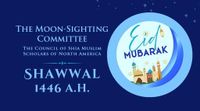CEBU CITY, Philippines — On April 1, 2025, thousands of Filipino-Muslims will gather to celebrate Eid al-Fitr, marking the end of Ramadan. Malacañang has declared April 1 as a regular holiday in observance of this important Islamic holiday. President Ferdinand Marcos Jr. issued Proclamation No. 839, establishing April 1 as a regular holiday in accordance with recommendations from the National Commission on Muslim Filipinos (NCMF).
"In order to bring the religious and cultural significance of the Eid’l Fitr to the fore of national consciousness and to allow the entire Filipino nation to join their Muslim brothers and sisters in peace and harmony in the observance and celebration of Eid’l Fitr, it is necessary to declare April 1, 2025, Tuesday, a regular holiday throughout the country," President Marcos Jr. stated in his proclamation.
Eid al-Fitr is one of the key holidays in the Islamic calendar, also referred to as the Hijri calendar. It translates to the feast or festival of breaking the fast and is celebrated at the conclusion of Ramadan, the holy month of fasting. In the Philippines, the observance of Eid al-Fitr for 2025 falls on April 1, while last year it was celebrated on April 9.
The celebrations of Eid al-Fitr can last for up to three days in some areas. During this holiday, Muslims typically celebrate with family and friends, engaging in prayers and festivities that include family visits, gatherings, and wearing new clothes. A significant aspect of Eid al-Fitr is the practice of Zakat al-Fitr, where Muslims make donations to share their blessings, allowing the less fortunate to partake in the celebrations. This charitable act is one of the five pillars of Islam, emphasizing the importance of giving.
As Ramadan commenced on March 1, 2025, Muslims around the world have been observing a period of fasting, prayer, and reflection. The start of Ramadan is traditionally determined by the sighting of the crescent moon, which may vary among different communities due to various methodologies used to confirm the beginning of the month.
Meanwhile, in North America, the Moon-Sighting Committee of the Council of Shia Muslim Scholars has announced that Monday, March 31, 2025, will be the first day of Shawwal, 1446 A.H. This determination was made because there were no verified sightings of the crescent moon on the evening of Saturday, March 29, 2025, in any region of North America. Consequently, Sunday, March 30, 2025, will be the last day of Ramadan.
The committee stated, "Eid Mubarak! We ask God, the Most High, to accept your fasting, grant success in performing good deeds, and to hasten the Return of Our Master, Imam Mahdi (p)." The Zakat al-Fitrah for 2025 in the United States is recommended to be $10.00 per eligible person, ensuring that everyone can celebrate Eid al-Fitr.
In France, the Muslim community will officially celebrate Eid al-Fitr on Sunday, March 30, 2025. The Grand Mosque of Paris confirmed this date, along with the French Council of the Muslim Faith (CFCM), following a “Night of Doubt” held on March 29. The CFCM has set the amount of Zakat al-Fitr for 2025 at 9 euros per person.
Eid al-Fitr, known as the “Festival of Breaking the Fast,” holds significant cultural and religious importance for Muslims globally. It is a time of joy, gratitude, and unity as families and communities come together to celebrate the completion of a month dedicated to fasting, prayer, and self-reflection. France, which has one of the largest Muslim populations in Europe, will witness grand celebrations across its cities, with diverse Muslim communities participating.
While the spirit of the celebration unites Muslims, there are various traditions and interpretations within the community. Various Islamic organizations and mosques may follow different methods for determining the date of Eid, with some relying on astronomical calculations while others depend on moon sightings.
In addition to prayers and charitable giving, Eid is a time for strengthening familial and social bonds. Families gather for festive meals, exchange gifts, and visit loved ones. Many Moroccan families in France, for example, prepare traditional dishes such as msemen and baghrir, and some even travel back to Morocco to celebrate with relatives.
On the morning of Eid, special prayers known as Salat Al Eid are held, drawing large gatherings of worshippers in mosques and open spaces. The celebration of Eid al-Fitr is not only about feasting and festivities but also about ensuring that everyone, regardless of their financial status, can partake in the joy of the holiday.
As communities around the world prepare for Eid al-Fitr, the spirit of compassion and community that Ramadan encourages will be highlighted. Looking ahead, the next major Islamic holiday, Eid al-Adha, is expected to fall on the evening of June 6 and conclude on June 7, 2025. Known as the “Festival of Sacrifice,” this holiday commemorates the willingness of Prophet Ibrahim to sacrifice his son in obedience to God. Until then, Eid al-Fitr remains a time to celebrate life’s blessings, give thanks, and reconnect with loved ones in peace and unity.








